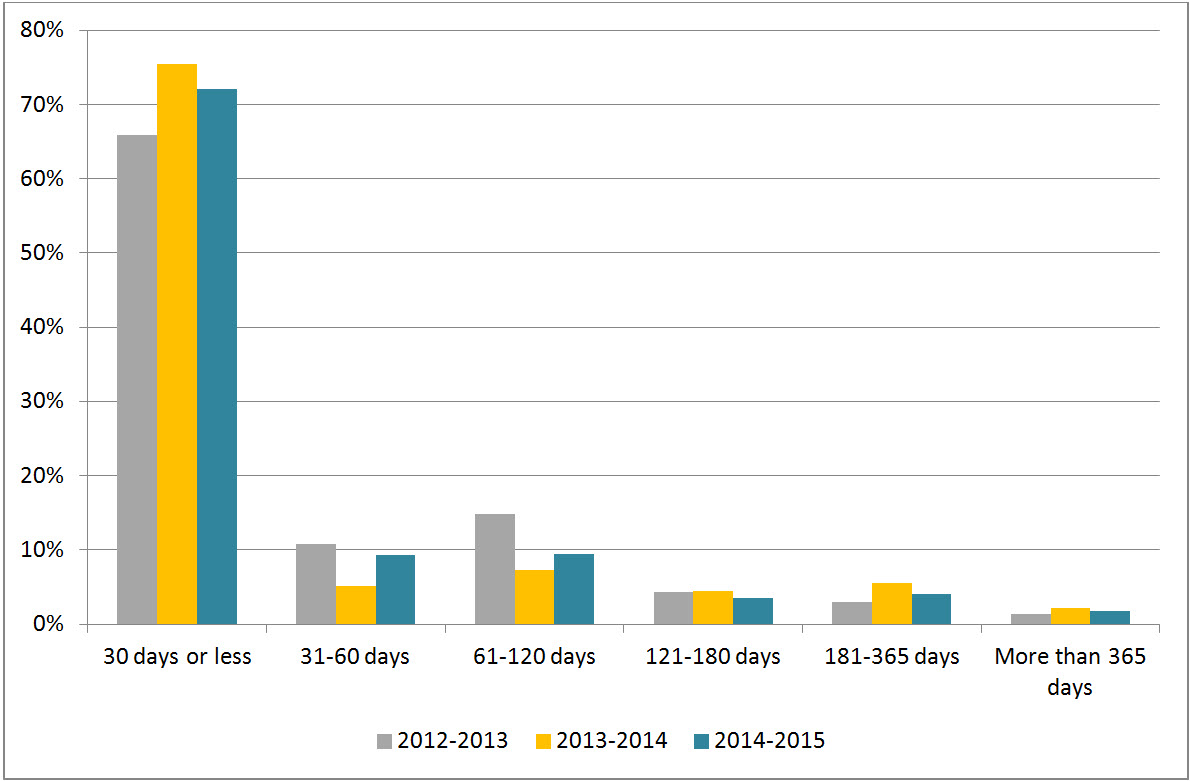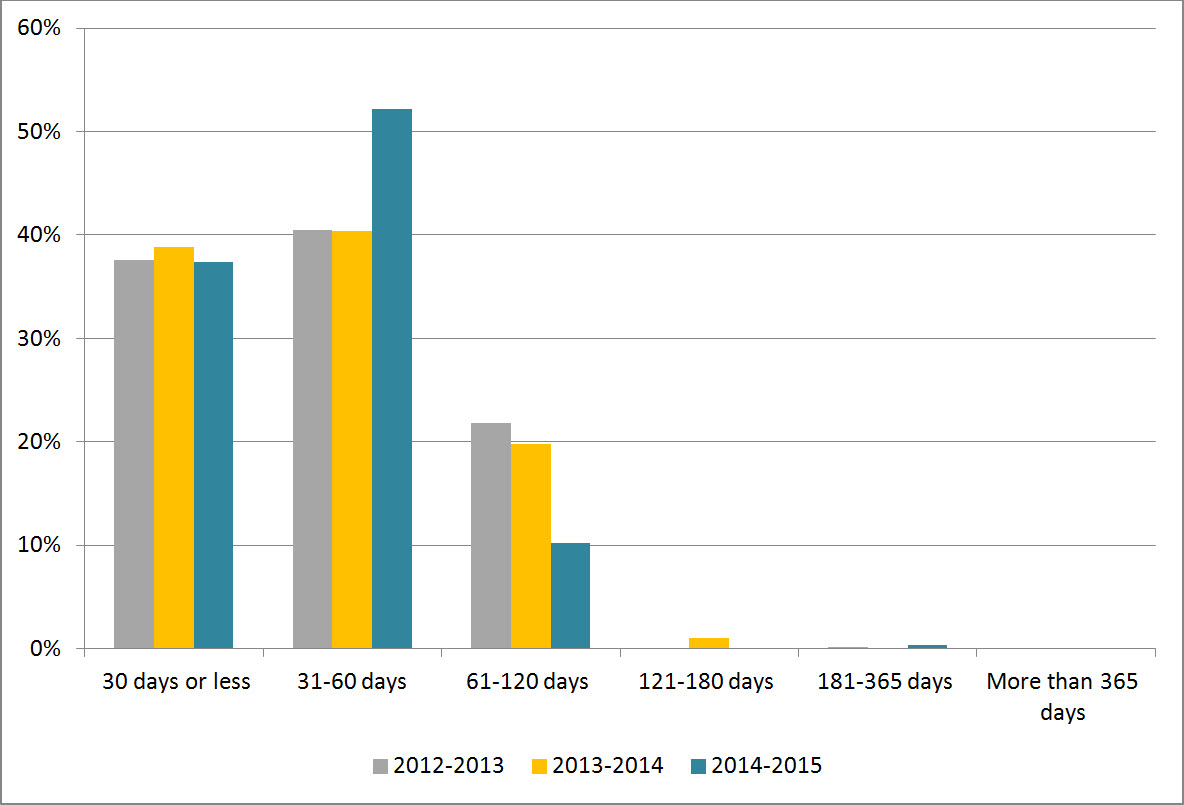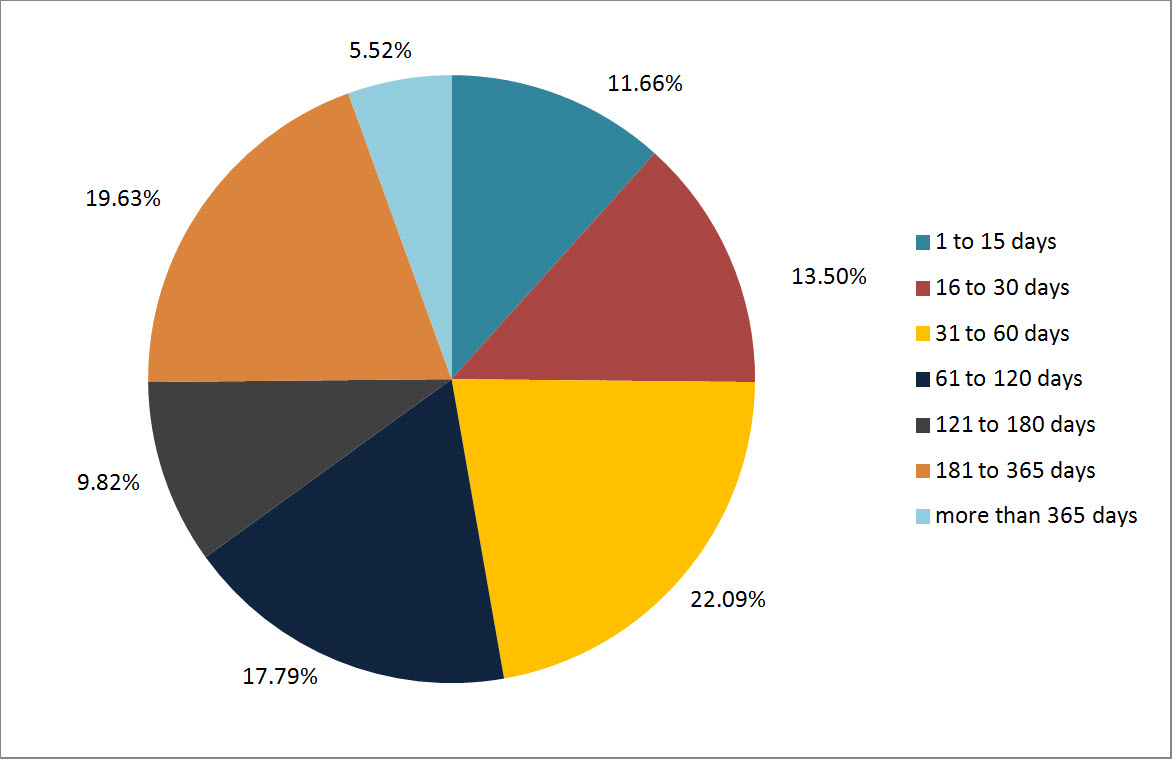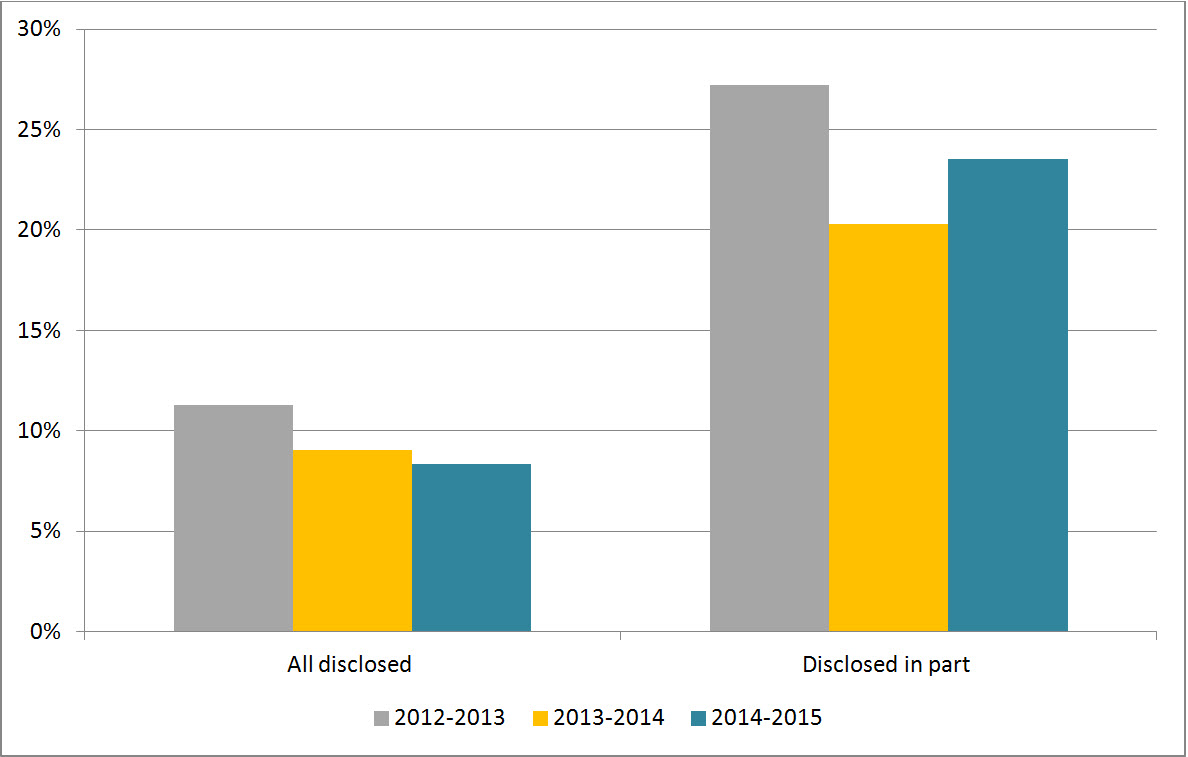2014-2015 Environment and Climate Change Canada
Overall performanceFootnote 1
In 2014-2015, Environment and Climate Change Canada (ECCC) reported receiving more requests than the last reporting period and also showed a slight decrease in performance. This report provides comparative statistics for the last three periods (2012-2015).Footnote 2
Workload
ECCC received a total of 1,488 requests under the Access to Information Act (the Act), representing 2.2% of total requests received across government in 2014-2015. In 2013-2014, ECCC received 1,459 requests.
The majority of requests received were from the business sector (71.1%), followed by the media (12.7%). The number of requests from business increased by 20.8%, while a decrease of 53.8% and 37.5% was observed in the number of requests received from organizations and the public, respectively.
ECCC completed 1,452 requests this reporting period. The institution’s completion rateFootnote 3 was 84.5%, which is approximate to the government-wide rate of 85.1% for 2014-2015. In 2013-2014, the completion rate for ECCC was 86.4%. ECCC also completed 69 informal requestsFootnote 4 in 2014-2015, 94.2% of these within 30 days. The number of consultations received by ECCC from other government institutions increased from 175 to 200, presenting an increase of 14.3% compared to 2013-2014.
In 2014-2015, ECCC processed 110,557 pages. The average number of pages processed per completed request decreased from 295 in 2013-2014 to 192 in 2014-2015.
The information released by ECCC was mostly in paper format: 353 requests in paper compared to 110 in electronic format. This is similar to the previous year (329 requests in paper format compared to 89 in electronic format).
Table 1. Workload
| Measures | 2012-2013 | 2013-2014 | 2014-2015 |
|---|---|---|---|
| Number of requests received | 1,827 | 1,459 | 1,488 |
| Annual change (%) | - | -20.1% | 2.0% |
| Completed requests | 1,810 | 1,424 | 1,452 |
| Annual change (%) | - | -21.3% | 2.0% |
| Number of consultations received (from other government institutions) | 248 | 175 | 200 |
| Annual change (%) | - | -29.4% | 14.3% |
| Average number of pages processed per request completed | 153 | 295 | 192 |
| % of requests for which more than 1,000 pages were processed | 3.3% | 3.2% | 4.0% |
Request completion time
Timeliness
Figure 1 reveals that 72.1% of requests were completed within 30 days or less. This is slightly lower than the results observed in 2013-2014, which was 75.4%. The proportion of requests completed in 31 to 60 days almost doubled from 5% in 2013-2014 to 9.2% in 2014-2015. There is also a marginal reduction in the number of requests that took more than 365 days to complete.
Figure 1: Request completion time

Text version
Figure 1 is a bar chart with vertical bars, representing the completion time by ECCC during each reporting period between 2012-2013 and 2014-2015. The results are as follows:
| Completion time | 2012-2013 | 2013-2014 | 2014-2015 |
|---|---|---|---|
| 30 days or less | 65.91% | 75.42% | 72.11% |
| 31-60 days | 10.72% | 5.06% | 9.23% |
| 61-120 days | 14.75% | 7.30% | 9.44% |
| 121-180 days | 4.36% | 4.49% | 3.44% |
| 181-365 days | 2.93% | 5.55% | 4.06% |
| More than 365 days | 1.33% | 2.18% | 1.72% |
Extensions
ECCC took a total of 541 extensions in 2014-2015, compared to 476 in 2013-2014. The most common reason for taking an extension was interference with operations (39.9%), followed by consultations (30.6%), and third-party notice (29.3%).
Figure 2 shows that 37.5% of the extensions taken in 2014-2015 were for 30 days or less. This is a slight reduction of 1.5% from 2013-2014. Figure 2 also shows that the proportion of extensions taken between 31 and 60 days in 2014-2015 increased by 11.8% compared to 2013-2014. No extensions of more than 120 days were taken, as opposed to the previous period, where two extensions were taken between 181 and 365 days.
Figure 2: Length of extensions

Text version
Figure 2 is a bar chart with vertical bars, representing the length of extensions taken by ECCC during each reporting period between 2012-2013 and 2014-2015. The results are as follows:
| Length of extensions | 2012-2013 | 2013-2014 | 2014-2015 |
|---|---|---|---|
| 30 days or less | 37.57% | 38.87% | 37.34% |
| 31-60 days | 40.50% | 40.34% | 52.13% |
| 61-120 days | 21.79% | 19.75% | 10.17% |
| 121-180 days | 0.0% | 1.05% | 0.0% |
| 181-365 days | 0.14% | 0.0% | 0.37% |
| More than 365 days | 0.0% | 0.0% | 0.0% |
Deemed refusals
In 2014-2015, the number of requests closed past the statutory deadline was 163, which accounts for 11.2 % of completed requests. This rate represents a “C” grade.Footnote 5 The most common reason for overdue requests was workload (41.1%), followed by external consultations (33.7%).
Figure 3 shows that 25.2% of overdue requests were late by 30 days or less and that 35.0% were late by more than 120 days. These percentages are comparable to the previous period.
Figure 3: Lateness of overdue requests

Text version
Figure 3 is a pie chart, representing the delayed days for overdue requests taken by ECCC in 2014-2015. The results are as follows:
| Number of days | 2014-2015 |
|---|---|
| 1 to 15 days | 11.66% |
| 16 to 30 days | 13.50% |
| 31 to 60 days | 22.09% |
| 61 to 120 days | 17.79% |
| 121 to 180 days | 9.82% |
| 181 to 365 days | 19.63% |
| More than 365 days | 5.52% |
| Total | 100.0% |
Disclosure
Percentage of requests for which information was disclosed
In 2014-2015, 8.3% of completed requests were entirely disclosed. This is the lowest disclosure rate since 2012 (see Figure 4). Figure 4 also shows that the rate for partially disclosed requests was 23.6% in 2014-2015, which is an increase of 3.3% from the previous period.

Text version
Figure 4 is a bar-chart with vertical bars, representing the entirely disclosed and disclosed in part requests as proportion of total requests received by ECCC during each reporting period between 2012–2013 and 2014-2015. The results are as follows:
| Disclosure | 2012-2013 | 2013-2014 | 2014-2015 |
|---|---|---|---|
| All disclosed | 11.27% | 9.06% | 8.33% |
| Disclosed in part | 27.24% | 20.29% | 23.55% |
Exemptions
In 2014-2015, a total of 886 exemptions were used compared to 801 the previous period. We note that on average, the number of exemptions used per completed request (0.61) was approximately the same this reporting period as in 2013-2014 (see Table 2).
The most common exemptions in 2014-2015 were section 19 (Personal Information) (33.4%), section 21(Operations of Government) (28.6%) and section 20 (Third-Party Information) (19.4%).
Table 2: Exemptions
| Exemptions | 2012-2013 | 2013-2014 | 2014-2015 |
|---|---|---|---|
| Total number of exemptions | 1,181 | 801 | 886 |
| Total number of completed requests | 1,810 | 1,424 | 1,452 |
| Average number of exemptions per completed request | 0.65 | 0.56 | 0.61 |
Complaints at the OIC
The number of complaints receivedFootnote 6 by the OIC against ECCC was 26 this reporting period, which is three less than in 2013-2014. The majority of complaints received were administrative (4 refusals and 22 administrative), whereas the majority for the previous period were refusals (19 refusals and 10 administrative).
From those received in 2014-2015, 16 were well-founded and resolved, 2 were not well-founded, 7 were discontinued and 1 was settled.
Footnotes
- Footnote 1
-
Overall performance is based on two primary indicators: % of requests completed within 30 days, % of requests that were fully disclosed.
- Footnote 2
-
The name of Environment Canada was changed to Environment and Climate Change Canada.
- Footnote 3
-
The completion rate was calculated using the number of received requests during the reporting period as well as outstanding requests from the previous period.
- Footnote 4
-
According to ECCC’s annual report, a total of 74 informal requests were received in 2014-2015.
- Footnote 5
-
The 2007-2008 OIC report card grading system was used to estimate the grade A= 0 to 5%; B= 5 to 10%; C=10 to 15%, D= 15 to 20%, F=20% and more.
- Footnote 6
-
The numbers reported in this section are based on the OIC’s statistics. The information may not reflect the statistics reported by institutions due to the discrepancies in the methodology used.